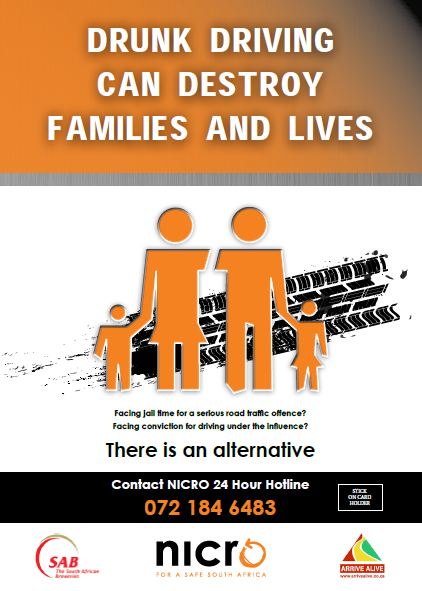Economy and Enterprise Development Department met with liquor traders and community to discuss challenges of alcohol abuse and enforce responsible trading and compliance to conditions of license.
Liquor awareness campaign was held recently in Mphebatho Museum, Moruleng, at Moses Kotane Local Municipality under the theme “Working together to eradicate alcohol abuse”.
This, campaign follows concerns on significant increase of alcohol consumption amongst youth. Department noted that alcohol abuse does not only has harmful effects on the body, but also results in increased levels of conflict in the family, violence, sexual violence and high risk sexual behaviours, among others.
Delivering keynote address on behalf of MEC Wendy Nelson, Mr Moeketsi Senqhi; Chief Director: Corporate Services said there is no doubt that alcohol abuse is high amongst young people and poses serious concern since it doesn’t only have an impact on the health of the country’s citizens but also on the economy.
“With the existing challenges of inequality, unemployment and poverty, the scourge and prevalence of alcohol abuse increase the strain on the economy”.
According to Senqhi, the department has so far issued plus minus 6 500 licences to outlets ranging from taverns, restaurants, bottle stores, accommodation and brewers’ licences.
Department has in the past years and to date been actively conducting meetings with liquor forums and community policing forums (CPF’s) to encourage communities not to use alcohol excessively. Liquor inspectors from department have been visiting outlets day and night to monitor compliance on conditions attached to licence.
Regardless of this, there are still challenges in terms of compliance with regard to sale of liquor beyond stipulated hours, selling of liquor to minors, pregnant women and over intoxicated patrons. Such allows unruly behaviour in liquor outlets that results to public indecency and incidents of violence which some of the complaints are received by the North West Liquor Board.
“We are not undermining the economic opportunities available to those engaged in the industry, but the message we want to put across is for licence holders to act more responsibly and familiarise themselves with the legislative requirements and trading conditions of the licences, so that they can act responsibly and make informed decisions when selling alcohol to patrons,” said Senqhi.
Chairperson of North West Liquor Board, Adv. Ruth Dzanibe said the board is flooded with requests from liquor traders on extension of trading hours and to trade on Sundays by off-consumption licence holders.
Dzanibe added that Bokone Bophirima is regulated by Liquor Act No.27 of 1989 as amended and the National Liquor Act No: 59 of 2003. There is nowhere in these Acts that the extension of trading hours is permitted except for section 54(2) of the Liquor Act No.27 of 1989, as amended which allows hotel liquor licence holders to can apply for extension of trading hours.
The event was preceded by a four (04) days liquor compliance inspection blitz in Moruleng and other surrounding villages.
During the inspection, department noted illegal leasing of liquor trading premises to foreigners and some do not qualify to trade and they undermine the rule of tribal authority. Police report indicates that some of the outlets have been infiltrated by criminals to conduct criminal activities such as prostitution and drug trafficking.
Khathu Mudau, Assistant Director National Liquor Authority within Department of Trade and Industry said the department is busy with public consultations on liquor policy review.
He said the review is part of an effort to regain control of liquor business in South Africa and it follows on from the publication into law in February 15 of the Norms and Standards in terms of Liquor Act, 59 of 2003.
Norms and Standard state that “All provincial liquor legislation must be harmonised with the Liquor Act, 2003. The liquor Act 1989 must be repealed by the end of 2016/17 financial year, as it creates incoherence, fragmentation and limits the ability to enforce liquor laws in South Africa.
The department is currently drafting its own liquor bill. This bill has to date been published in the government gazette for comments by the public and other interested parties.
Norms and standards address issues within the current legislative framework such as verification of age, uniform trading hours, supply of liquor to minors, sale or supply of liquor to intoxicated person. Other issues include payment of income tax, provision of free drinking water and ablution facilities, noise nuisance and evacuations measures.
This document is awaiting publication to become enforceable. It will reflect the provision of capping number of licenses to be issued in the country; reality is, it is going to be difficult to obtain liquor licence in future. Liquor traders are encouraged to take good care of their businesses by complying with the conditions that are attached to the license, so that they do not end up losing them.
“It is not only adults abuse liquor, we have school going boys of the age of 16 to17 years who indulge in liquor. It is sad because they also indulge in binge drinking; our girls are not far behind in this regard”.
“Alcohol abuse is slowly eating social fibre of our communities, this impediment needs collective effort with relevant stakeholders to curb embarrassment that the country is facing”, concluded Mr Senqhi.
